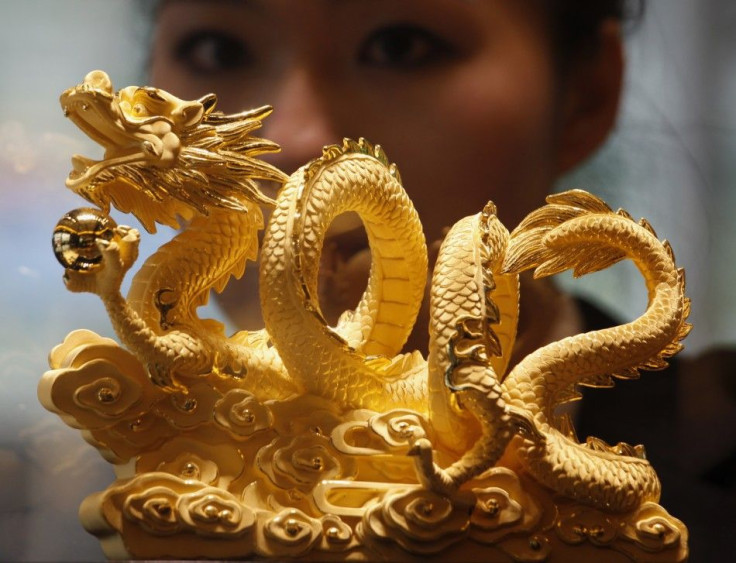Chinese Banks Promote Gold Sales to Retail Investors
ANALYSIS

(REUTERS) -- For Chinese shipping executive Ping Bo buying gold is the best way to protect his family's wealth and give his 10-year-old son a headstart into adulthood.
For my son, the idea is that he will get a nice stash of gold that he can cash out when he turns 21 or when he gets married, said Ping, one of over 2 million people that have opened accounts in the past two years to accumulate gold at the Industrial and Commercial Bank of China (ICBC).
The ICBC launched the accounts in April 2010. The gold that it has bought to back them is only a fraction of total Chinese demand, but the explosive growth in the number of investors that have signed up is a symptom of the wider demand for the precious metal in the world's most populous country.
China, expected to overtake India as the world's top gold consumer in the next few years, accounted for 23 percent of the world's total consumer physical gold demand in the first three quarters of 2011, up from 19 percent in 2010, according to the World Gold Council (WGC).
Growing wealth in a traditional culture that favors gold, economic uncertainty and looser regulations on the domestic gold market together have combined to create rapid growth in China's gold demand.
The accounts are one of a range of methods that China's banks have come up with that allow small investors like Ping access to the gold market.
Investors buy as little as a gram a month through the accounts, a tiny quantity but one that adds up when the middle class of the world's most populous country is involved.
It's a fantastic way for me to accumulate gold, said Shanghai-based Ping.
ICBC's accounts drew 2.33 million investors by the end of November, according to the bank, just 19 months after the launch, with 22 tons of gold held to back them.
Agricultural Bank of China said that for a similar product launched in September, more than 70,000 clients signed up to buy a minimum of one gram of gold per month.
The product will retain its vitality as long as the demand for physical gold investment keeps growing, said the bank in a written reply to a Reuters enquiry.
The ability of China's banks to keep money flowing into bullion investments will play a major part in supporting gold prices this year, after spot bullion pulled back to around $1,660 an ounce from a record above $1,920 in September.
The Chinese really love gold, said Shi Xudong, deputy head of the Administration Office of the Precious Metals Department at ICBC (1398.HK) (601398.SS).
The fact that the government has started to clean up the gold market is favorable to our business, as investors who have been trading on illegal platforms will need to look for new investment platforms.
He referred to a recent statement from China's central bank on cracking down on informal gold exchanges outside the Shanghai Gold Exchange and Shanghai Futures Exchange.
ICBC, the biggest among the country's commercial banks in precious metals, also offers paper gold, a way for investors to buy and sell without taking physical delivery, and allows retail investors to trade on the Shanghai Gold Exchange through its platform.
In the first 11 months of 2011, the bank's clients traded 295 tons of gold on Shanghai gold forward contracts and 615 tons on paper gold. In 2011, the bank sold 50 tons of physical gold products and 70 tons of silver products, ICBC said.
CHINA GOLD DEMAND TO RETAIN HIGH GROWTH
In the first three quarters of 2011, China's jewellery demand shot up 34 percent on the year to 376.8 tons, while demand for coins and bars surged 89 percent to 204.1 tons, according to the WGC.
Albert Cheng, Managing Director of the WGC, Far East, estimated total jewellery consumption would grow to 500 tons and physical investment demand exceed 250 tons in 2011, which would bring total demand up at least 18 percent from a year earlier.
In 2012, both investment and jewellery demand will retain growth, albeit at a lower pace, Cheng told Reuters in an interview.
He estimated that investment demand would grow 25-30 percent, and jewellery demand 6-10 percent, in 2012.
Volume on gold derivative trades could be 15 to 20 times physical investment demand, Cheng said.
As a sign of surging demand for bullion, China's gold imports from Hong Kong in the first 11 months of 2011 more than tripled on the year.
China has one of the world's highest saving rates, and the public faces few investment options. A volatile stock market and a property market under government crackdown are driving investors to seek alternative investment choices.
Chinese investors are looking for ways to protect their savings from negative real interest rates, said Nick Trevethan, Senior Commodity Strategist at ANZ in Singapore.
A diverse saving portfolio could help.
© Copyright Thomson Reuters 2024. All rights reserved.












